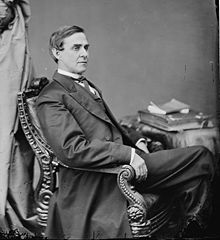Charles R. Buckalew
| Charles R. Buckalew | |
|---|---|
 |
|
| Member of the U.S. House of Representatives from Pennsylvania's 17th district |
|
|
In office March 4, 1889 – March 3, 1891 |
|
| Preceded by | Edward Scull |
| Succeeded by | Simon P. Wolverton |
| Member of the U.S. House of Representatives from Pennsylvania's 11th district |
|
|
In office March 4, 1887 – March 3, 1889 |
|
| Preceded by | John B. Storm |
| Succeeded by | Joseph A. Scranton |
|
United States Senator from Pennsylvania |
|
|
In office March 4, 1863 – March 4, 1869 |
|
| Preceded by | David Wilmot |
| Succeeded by | John Scott |
| Member of the Pennsylvania House of Representatives | |
|
In office 1871 |
|
| Personal details | |
| Born |
Charles Rollin Buckalew December 28, 1821 Fishing Creek Township, Pennsylvania, U.S. |
| Died | May 19, 1899 (aged 77) Bloomsburg, Pennsylvania, U.S. |
| Political party | Democratic |
| Spouse(s) | Permelia Wadsworth Buckalew |
| Profession | Politician, Lawyer |
Charles Rollin Buckalew (December 28, 1821 – May 19, 1899) was an American lawyer and Democratic party politician from Bloomsburg, Pennsylvania. He served in the state senate and represented Pennsylvania in both the U.S. House and Senate. He was a graduate of Harford Academy, Susquehanna County, Pennsylvania, where he studied law. He was admitted to the bar in 1843.
Buckalew was the most influential early advocate of proportional representation in the United States. His proposals for a type of voting system known as cumulative voting gained significant support in Congress, and he played a central role in the adoption of cumulative voting in several places, including Illinois for state legislative elections in 1870, a system that lasted in that state until 1980.
Buckalew was elected by the Pennsylvania General Assembly to the U.S. Senate in 1863. In a number of speeches, notably in the Senate on July 11, 1867; at a large public meeting in Philadelphia in November of the same year; before the Social Science Association at Philadelphia in October 1870; and in the Senate of Pennsylvania on March 27, 1871; as well as in the report of the Select Committee on Representative Reform of the United States Senate, of which be was chairman, Buckalew argued persuasively for the use of cumulative voting in the election of representatives in Congress, state legislatures, town councils and other bodies.
Buckalew's bill in the Senate would have allowed all the electors of a state to have the number of votes equal to the number of house of representatives members to be elected from that state. The voter could give all his votes to one candidate, or distribute them in any fashion, equally or unequally, among candidates. The candidates with the highest number of votes would be elected.
...
Wikipedia
